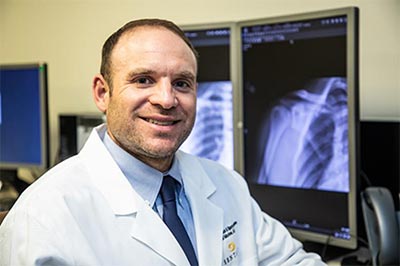The Rare Meniscus Transplant

Sponsored - Whether you’re a weekend warrior or a collegiate athlete, one of the most common injuries to the knee is a torn meniscus. Athletes in contact sports are particularly prone to the injury, but the truth is, anyone at any age can suffer from this injury.
The meniscus is a rubbery cartilage disc that helps support the knee joint and acts as a shock absorber between the thigh and shin bones. Often times an injury happens when the knee is twisted or suffers a direct hit. As we age it’s also possible to have a degenerative meniscus tear simply from worn tissue and weakened cartilage. Athletes will sometimes feel a telltale “pop” when the injury occurs, and can usually continue to walk and sometimes even play. But over the next few days the knee will become more sore and swollen.
Treatment of the injury will depend on the type of tear and its size. Sometimes doctors may consider letting the symptoms improve with rest, icing, elevating and using an elastic bandage to help with swelling.
In some cases, surgery may be necessary. Arthroscopic surgery is the most common option, where the damaged meniscus is trimmed away or sometimes repaired.
But a lesser known procedure is now an option locally. The meniscus transplant is still uncommon but is now being performed at Sentara RMH Medical Center. Dr. Chad Muxlow is the Director of Sports Medicine at Sentara RMH Medical Center. An accomplished knee surgeon, Muxlow was the first physician at Sentara RMH to perform a meniscus transplant. That patient was a 19-year-old college student and met the strict criteria to qualify for the transplant. The procedure involves arthroscopy, along with a small incision to insert a new meniscus. While it was very beneficial for this patient, it is still rare and patients need to meet certain requirements to qualify.
“It’s not for everyone,” Dr. Muxlow said. “The cutoff age is generally about 55, and the knee must be mostly free from arthritis. If there’s significant arthritis present we will not perform a transplant because it will not alleviate the patient’s symptoms.”
Younger patients, who have severe meniscus damage that can’t be repaired, might benefit from a transplant which replaces the cushion of the meniscus with a donor meniscus to prevent further damage and pain in the future. For the select patients who benefit from the procedure, they will hopefully enjoy a delay in the onset of complications like arthritis.
Following the procedure, it will take about six to 12 months, for full recovery. Dr. Muxlow notes that physical therapy generally takes 4-5 months and the patient will initially use crutches and is typically in a brace for approximately 6 weeks. The meniscus transplant is a technically demanding procedure with very few surgeons being trained to perform it.
Patients who undergo knee surgery must also take physical therapy in order to regain the full use of their limb. Sentara Therapy Services provides a comprehensive and customized approach to rehabilitation, with highly trained therapists holding specialty certifications in sports medicine, hand therapy, golf, women’s health, aquatic therapy, lymphedema and wound care.
Source: WHSV TV-3
